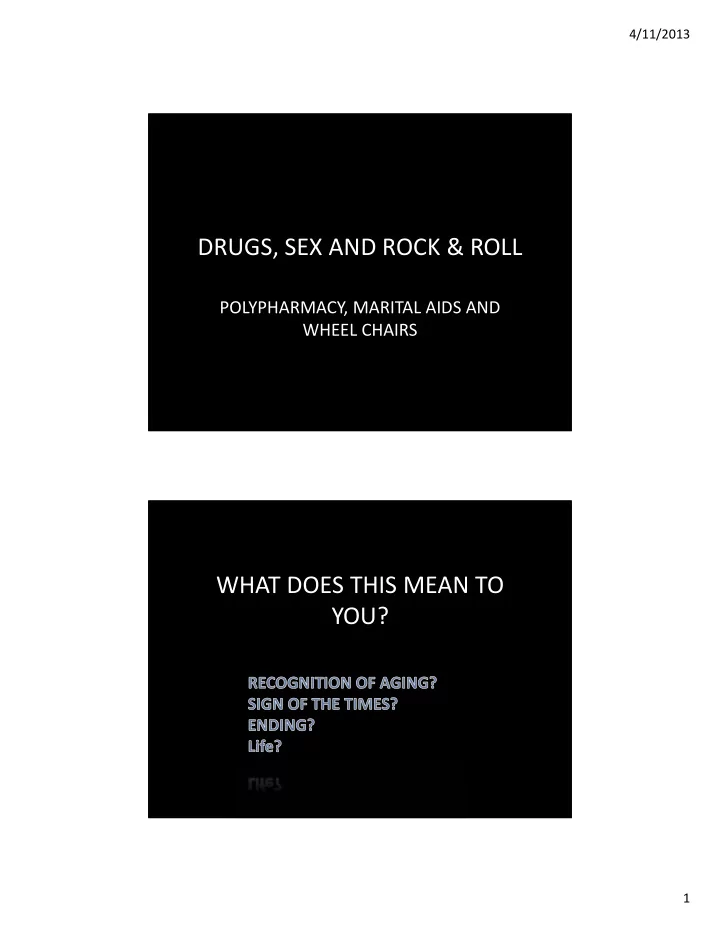

4/11/2013 DRUGS, SEX AND ROCK & ROLL POLYPHARMACY, MARITAL AIDS AND WHEEL CHAIRS WHAT DOES THIS MEAN TO YOU? 1
4/11/2013 A TIME FOR REFLECTION How does aging impact us as individuals? How does it impact us as family members? Individually • Some things are better? • Some things aren’t as good as they used to be. • Some things are just no longer interesting. • Some things are more interesting than every before. What has changed? • Partners • Jobs • Perspectives on life and what is important? 2
4/11/2013 PROFESSIONALLY • What has changed as you’ve aged? • What is changing for your friends and family as they age? WHAT DOES THIS MEAN TO US? DO WE KEEP ROCKIN’? 3
4/11/2013 MOVE TO MORE PEACEFUL PURSUITS? SERENITY? 4
4/11/2013 SOMETHING ELSE? THE END OF EVERYTHING? 5
4/11/2013 HARDLY! WHAT ARE THE FACTS? • What is the fastest growing age group in the U.S.? – 85 years of age and older • What is the most significant psychological issue diagnosed in those over 60 years of age? – Anxiety: How to deal with it? 6
4/11/2013 Depression • What percentage of those over 65 years of age are diagnosed with depression? – People 65+ living at home a low rate (1%) compared to the general population. Nursing home rates are much higher 25 to 40%. – Self ‐ report scales are used for assessment. Interviews are preferred for diagnosis. – Assessment of an older adult should include a medical exam. Recommended it be done first to r/o medical problems, medications taken and substance abuse (not readily disclosed). Treatment for depression • Most effective is a combination of CBT and pharmacotherapy – Patient seen as being unduly negative in their beliefs and employ maladaptive information processing strategies. – ECT for cases not responding to 7
4/11/2013 ALZHEIMER’S DISEASE • Depression can be first symptom – Estimated: 30 – 50% of AD patients have depression • Dementia and death – About 5% of people between 65 and 74 develop Alzheimer’s. CHRONIC DISEASE • Statistically, arthritis is present with 50% of females over 65, males over 75. • 80% adults over 60 have chronic disease; pain is most common complaint • ½ of all drugs OTC are taken by people 60+ 8
4/11/2013 How long will I live? • 25% of longevity is attributed to genes (identical twin studies) • 75% dependent on environmental/behavioral influences Segal, D.L., Qualls, S.H. & Smyer, M.A. Aging and Mental Health, 2 nd ed. Wiley ‐ Blackwell. 2011 NEW OPPORTUNITIES FOR US 9
4/11/2013 SERVING OURSELVES THROUGH PREPARATION • What three things to slow the onset of negative aspects of aging? – Social Involvement – Physical Fitness (especially aerobic) – Mental stimulation ‐ new languages, new neural pathways, new learning – Continued sense of meaning and purpose LIFE ISSUES Family Grandchildren Being born Providing some level of care Loss Partner Parents Children Friends Career 10
4/11/2013 LIFE ISSUES MENTAL ACCUITY • Remembering facts, figures not an issue. • Problem solving, however, can be more challenging. Can still do it, but it may take a little longer. People over 50 PLAN BEYOND THE FINANCIAL 11
4/11/2013 RETIREMENT DEVELOPMENT Impacts Psychological Identity Self ‐ esteem Financial Short ‐ term Long term Family How does it change your relationship, if at all? FAMILY • Partner loss ‐ grief comes at all ages. How is this different for the senior citizen? – Assistance in dealing with a wide variety of concerns – Holder of stories that make up our life narrative – Financial loss – Entertainment – Listener – General support 12
4/11/2013 FAMILY • Seniors taking care of their parents – 85+ is the fast growing age group in the country – Consequences • Reduced social contacts • Reduce ability to deal with own needs • Feelings of guilt for feeling resentment, but also experience feelings of satisfaction due to “giving back” • Increasing disappointment about fading dreams SO? For the most part what you are doing now will determine what you will be able to do 10 and 20 years from now and beyond. Physically, Mentally, Socially BUT WE NEED A PLAN 13
4/11/2013 WHAT TO CONSIDER? • Relationship questions and complaints – What are you doing here? – No, you can’t tell me how to do it! – How much time can we possibly spend with each other? • Social – Work friends – Couple friends (if a couple) – Family – Activities • Intellectual – Growth – Stimulation – Decline • Spiritual – Find the cause that gives meaning a purpose WHAT COMES NEXT? New career? Hobbies? • What are my interests? • What are my abilities • Who would I work for? • What will I do to keep me getting out of bed and feeling good about what I’m • doing with my life? What can I volunteer to do? • What do I like to do? • Who needs me? • Entrepreneurs • • What business could I start? • Silver Spokes—leading groups of bicyclists who are senior citizens based on ability • What might be yours? • 14
4/11/2013 IT’S UP TO YOU! 15
Recommend
More recommend